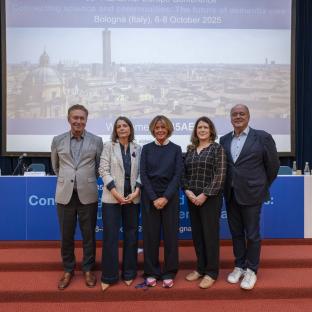Special Symposium 1, “Translating innovation into improved Alzheimer’s care”, organised by conference Gold sponsor Lilly, was an immersive symposium that invited participants to ‘walk in the shoes’ of those shaping the future of dementia care. It opened with the screening of a moving video, called “Hero”. The session, led by scientific journalist Elena Meli (Italy), aimed to shine a spotlight on the powerful intersection of scientific innovation and community engagement, focusing on one of the most pressing challenges in Alzheimer’s disease (AD): achieving a timely and accurate diagnosis.
A panel of experts, including Catherine Reed, Senior Director, International Values, Evidence and Outcomes, Eli Lilly and Company, Lutz Frölich, Head of the Department of Geriatric Psychiatry, Central Institute for Mental Health, Mannheim (Germany), and Jean Georges, Executive Director, Alzheimer Europe took part in a roundtable discussion exploring how decades of research are now converging into transformative diagnostic and therapeutic innovations. With the potential to modify the course of AD on the horizon, time is of the essence, to ensure early and accurate diagnosis, as well as timely intervention, when they can make the biggest difference. The symposium included segment called “Gamification: Put yourself in a policy makers’ shoes: Where would you invest to advance the health care system?” which gave delegates an idea how prioritising and financing different aspects of the dementia health environment impacts on outcomes.
The symposium was closed by Senator Beatrice Lorenzin, former Italian Health Minister who gave an update on Italian actions on dementia emphasising the need both for a long-term strategy addressing all societal issues important to people with dementia and a more short-term framework to improve timely diagnosis and preparing the access to new innovative treatments. She also called for the development of a European Alzheimer’s strategy and the importance of fully involving people with dementia in policy planning.
Senator Lorenzin stated: “A strong collaboration between institutions, patients, and their associations is essential to transform real needs into concrete public health policies, and international opportunities for dialogue such as the Alzheimer Europe Conference move precisely in this direction. As the Parliamentary Intergroup on Neurosciences and Alzheimer’s, we are working to ensure that therapies capable of slowing cognitive decline for defined groups of patients reach them in the shortest possible time. For this reason, a shared commitment, both national and European, is extremely necessary to achieve the definition of a European Plan for Alzheimer’s and Dementia, based on equity, access to innovation, and mutual support among countries.”
